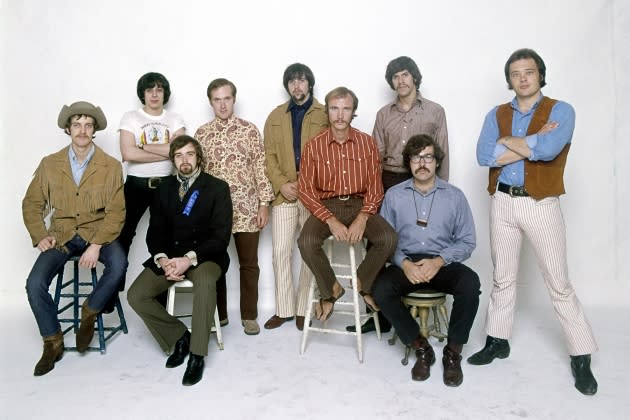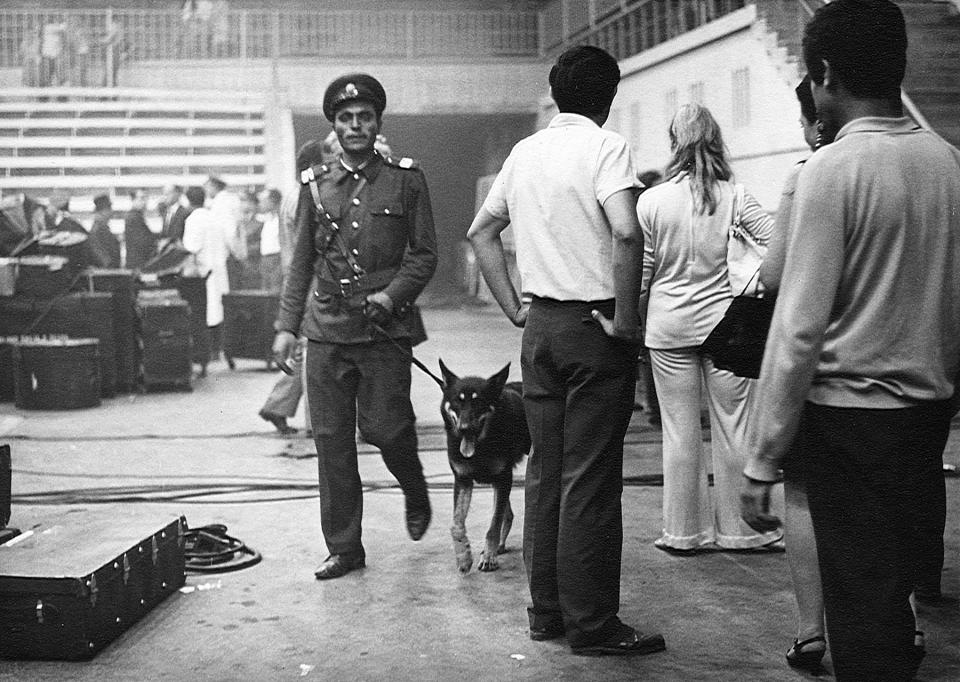Blood, Sweat, and Blackmail: How an Iron Curtain Tour Ruined a Rock Giant

Music and politics were always entwined for Steve Katz. As a teenager in the Sixties, he’d travel from his apolitical family’s home on Long Island to Greenwich Village, where he’d watch radical folkies like Tom Paxton, Ramblin’ Jack Elliott, and Dave Van Ronk play. He grew especially close with Van Ronk, who taught Katz guitar — and took him to socialist party meetings.
So it was frustrating and difficult when, in 1970, the U.S. State Department announced that Blood, Sweat & Tears – the band Katz had co-founded in 1967 — would embark on a government-sponsored tour of three Soviet satellite states, Romania, Poland, and the former Yugoslavia. Richard Nixon was in the White House; the Vietnam War was raging; and all Katz could do was pack his bags, grit his teeth, and tell The New York Post, “I hope when we come back we’ll give more free concerts and raise money for the Panthers.”
More from Rolling Stone
Oliver Stone Advocates for Nuclear Energy to Curtail Climate Change in Doc Trailer
A Frank Talk With the Ex-Pornhub Employee in Netflix's 'Money Shot'
Blood, Sweat & Tears’ Iron Curtain tour remains one of the strangest (and worst) decisions in rock history. At the time, they were one of the biggest bands in the country: Their 1969 self-titled album spawned three hits (“Spinning Wheel,” “And When I Die,” and “You’ve Made Me So Very Happy”) and won Album of the Year at the Grammys, beating out the Beatles’ Abbey Road alongside classics by Johnny Cash, the 5th Dimension, and Crosby, Stills & Nash. But after touring the Eastern Bloc, their standing cratered, pilloried on the left for being government pawns, pilloried on the right for being peaceniks playing rock and roll for commies on the government’s dime. The band carried on for decades — its lineup a revolving door of top jazz and rock players — but their status never recovered.
So why’d they do it?
“We were blackmailed,” Katz tells Rolling Stone. “We had to do this, or we wouldn’t have had a lead singer.”
This is the story BS&T finally tells 50 years later in the new documentary, What the Hell Happened to Blood, Sweat & Tears? (premiering March 24 in New York City and Los Angeles). It includes the revelation that, according to the group, they were forced to do the tour or their frontman David Clayton-Thomas — a Canadian citizen with a petty criminal record as a teenager — would be deported. But the film, directed by John Scheinfeld, is also an archival marvel, offering a comprehensive look at the tour and its aftermath with newly-discovered and remastered concert audio, as well as 53 minutes of unreleased video intended for a contemporaneous documentary that wasn’t just scrapped, but buried under still-unexplained circumstances.
The film is a fascinating look at a little-known chapter of rock history, offering fresh insights and facts while also conjuring perennial questions about propaganda, power, and polarization. As Katz tells Rolling Stone, “It was a pretty amazing experience, to be behind the Iron Curtain, and change my mind a little bit about what it’s like to live in an authoritarian country … The audiences were so great that I said to myself, ‘Wow, we’re really doing something here. I mean, we’re really making people happy.’”
But a bad taste still lingers, he adds: “I resented what happened to us. I lost a lot of friends and we lost a lot of [our] audience. And we couldn’t say anything about it.”
THE IRON CURTAIN TOUR WAS part of the State Department’s long-running Cultural Presentations Program, which sent American musicians around the world in a classic display of soft power. Throughout the 1950s, America’s musical exports were classical and jazz, with luminaries like Louis Armstrong, Benny Goodman, Duke Ellington, and Dizzy Gillespie participating in tours. But rock and roll’s potential became inevitable in the Sixties, especially after the global youth movements of 1968.
“It became clear to the State Department that young people were moving politics forward, and it would be best to connect with them,” says Ohio State University professor Danielle Fosler-Lussier, who appears in What the Hell Happened and literally wrote the book on the Cultural Presentations Program. “And to reach young people, you have to send music that young people are interested in.”
Blood, Sweat & Tears were the first major rock band to go on such a tour. Discussions likely began in fall 1969, not long after the band played Woodstock. Larry Goldblatt, BS&T’s shrewd and shady new manager (who’d just gotten out of prison for passing bad checks) spearheaded the initiative. It’s unclear if Goldblatt or the State Department instigated the conversations; but it’s undeniable that Clayton-Thomas’ immigration status was precarious.
Hailing from Toronto, Clayton-Thomas regularly crossed the border for gigs. He eventually settled in New York City, but was deported in 1968: “I’d been there for almost a year, working clubs,” the 81-year-old says today. “Technically, I was there illegally; I didn’t have a visa. Somebody turned me in. They came to my apartment at four in the morning, which the police always do — they love that four-to-six a.m. crap — hauled my ass, and put me on a plane back to Canada.”

But he was back in the U.S. within months, recalled to NYC to audition for Blood, Sweat & Tears after the departure of co-founder Al Kooper. Amidst the band’s ensuing success, they secured a working visa for Clayton-Thomas, but it required regular renewal, and his adolescent criminal history loomed large. By fall 1969, deportation seemed imminent.
Though there’s no proof, BS&T drummer Bobby Colomby tells Rolling Stone it “felt like someone from the government was pissed off” at the band. Katz notwithstanding, they weren’t particularly political, but like other artists at that time, when they were asked about, say, Vietnam, they spoke their minds. “When you’re successful, they put mics under your chin,” Colomby says. “We were the last people you should be interviewing about anything other than music, but we would answer: ‘No, this sucks. This is horrible what’s going on Vietnam.’”
Clayton-Thomas adds, “I think it was a whole attitude that we were part of the anti-war movement. Remember, they had John Lennon followed by FBI agents and they revoked his visa, too.”
About a week before Blood, Sweat & Tears left for Europe, on June 12, 1970, the State Department hosted a reception. “I showed up in a cobra skin jacket and a T-shirt with a big peace sign on the front,” Clayton-Thomas recalls. “A couple State Department people pulled me aside and said, ‘The T-shirt’s gotta go.’ I said, ‘I’m sorry, that’s all I got!’ Can you imagine? The government is getting bent out of shape because I got a peace sign on my T-shirt.”
The artists who went on these state-sponsored tours were often to the left of the U.S. government, Fosler-Lussier notes. But they saw an opportunity to travel, meet new people, and maybe even “advance their own peaceful aims.” Especially for Black artists during the Civil Rights era, it could be a fraught arrangement, but it never stopped participants like Louis Armstrong or the contralto Marian Anderson from being forthright about American racism.
In fact, public dissent or disagreement was arguably advantageous for the U.S. government. Clayton-Thomas, for instance, told a Yugoslavian youth magazine, “When I went to Washington for a reception, prior to our departure, I stood before American journalists and said that I am not going to Yugoslavia to tell those people what a good and wonderful government we have. I am in opposition.”
To the State Department, you couldn’t manufacture a more exemplary display of good ol’ American free speech. “A musician spoke out against the government, and nothing bad happened to him,” Fosler-Lussier says. “He wasn’t shot; he wasn’t taken away in a police van in the middle of the night. That was very powerful when Eastern Europeans could not speak openly against their government. In some ways, the State Department always has the upper hand over the musicians.”
Indeed, in an official report, the U.S. ambassador to Yugoslavia, William Leonhart, seemed more peeved at the “lack of politeness and consideration” BS&T showed when trying to wrangle the band for official receptions (compared to Duke Ellington, who played two shows in a day-and-a-half, attended every event, signed autographs, and “kissed all pretty girls on both cheeks!,” according to the report).
Even negative or critical local coverage was spun as positive. An article in a Zagreb student paper, Omladinski Tjendik (translated for Leonhart’s report), laid into the state-sponsored tour: “All of us know that the American Government is not something special, that it is primarily cunning businessmen who do not do certain things for peanuts… Whatever Uncle Sam does, and especially Nixon’s version, is done with a goal and calculation.”
The embassy’s big takeaway? Only that the author was upset the show was under “State Department patronage.” And besides, the author still “quoted from our USIS press releases.”

 Yahoo Autos
Yahoo Autos 